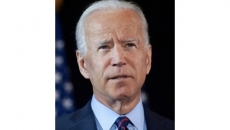Stocks ended another bumpy day lower on Wall Street and crude oil prices eased back as markets remain concerned about the broader impact of Russia’s invasion of Ukraine. The S&P 500 fell 0.5% Thursday.
The Nasdaq fell 1.6% as technology companies led the way lower. Less risky sectors like utilities gained ground. Major indexes had rallied a day earlier after Federal Reserve Chair Jerome Powell said he favored a modest interest rate increase at the Fed’s policy meeting in two weeks.
Bond yields were stable. Trading on the Moscow exchange remained closed and major credit agencies cut Russia’s credit rating.
EARLIER STORY:
Stocks shifted between gains and losses Thursday and oil prices eased back as markets remain concerned about the broader impact of Russia's invasion of Ukraine.
The S&P 500 rose 0.1% as of 2:35 p.m. Eastern. The Dow Jones Industrial Average rose 110 points, or 0.3%, to 34,002 and the Nasdaq fell 0.9%.
Bond yields were steady. The yield on the 10-year Treasury remained at 1.86% from late Wednesday.
The broader market remains volatile as investors continue to worry about the conflict in Europe along with rising inflation and the impact on economic growth and how central banks around the world act to try and restrain inflation.
Technology companies, retailers and other companies that rely on direct consumer spending had some of the broadest losses. Sectors that are viewed as less risky, including utilities and household goods makers, gained ground.
The major indexes rallied a day earlier after Federal Reserve Chair Jerome Powell said he favored a modest interest rate increase at the Fed’s policy meeting in two weeks, bringing relief to investors who had feared he would back more aggressive moves to fight inflation.
The economic fallout from the Russian invasion expanded, with Fitch Ratings and Moody’s Ratings cutting Russia’s credit rating. They said the invasion and Western sanctions have hurt Moscow’s ability to repay debts and raised risks for the economy and stability.
The London Stock Exchange said it had suspended trading in shares of 27 companies with links to Russia, including some of the biggest in energy and steel, such as Lukoil, Gazprom, Sberbank, Rosneft and Magnitogorsk Iron & Steel Works. Those shares lost most of their value prior to the suspension. Rosneft shares dropped from $7.91 on Feb. 16 to 60 cents on March 2, while Sberbank shares plunged from $14.90 to 5 cents in that same time frame.
Trading on the Moscow exchange remained closed Thursday. Russia's ruble lost another 15% against the U.S. dollar and is worth less than 1 cent. It has plunged since Western governments imposed sanctions that cut off much of Russia’s access to the global financial system.
Russia's invasion of Ukraine has been the dominant issue for investors all week as they try to assess its global economic impact. Russia is a key oil producer and prices have been rising as global supplies remain threatened by the conflict, raising concerns that persistent inflation could become even hotter.
Leaders of OPEC and other major oil-producing countries are sticking with plans to gradually increase oil production. Meanwhile, the U.S. and other major governments in the International Energy Agency plan to release 60 million barrels from strategic reserves to boost supplies.
The price of U.S. benchmark crude oil fell 2.6% to $107.67 a barrel and Brent crude, the international standard, fell 2.2% to $110.46. Both are still up more than 17% for the week.
Rising inflation and the Fed's reaction is still a big focus for investors with the impact of the conflict uncertain. Powell gave a second day of testimony before Congress Thursday, telling the Senate Banking Committee that Russia’s invasion of Ukraine will likely further magnify the high inflation that has engulfed the U.S. economy. At the same time, Powell said he is committed to doing whatever it will take to slow inflation, underscoring the central bank's high-risk challenge in raising interest rates enough to stem inflation without tipping the economy into another recession.
Investors will get another update on the U.S. jobs market on Friday when the Labor Department releases its report for February.
“What we're poised for is to really look hard at the jobs report tomorrow to see what the Fed needs to do and the state of the economy," said Rob Haworth, senior investment strategist at U.S. Bank Wealth Management. “Tomorrow’s average hourly earnings will provide a good read on inflation and whether consumers are able to keep up.”





